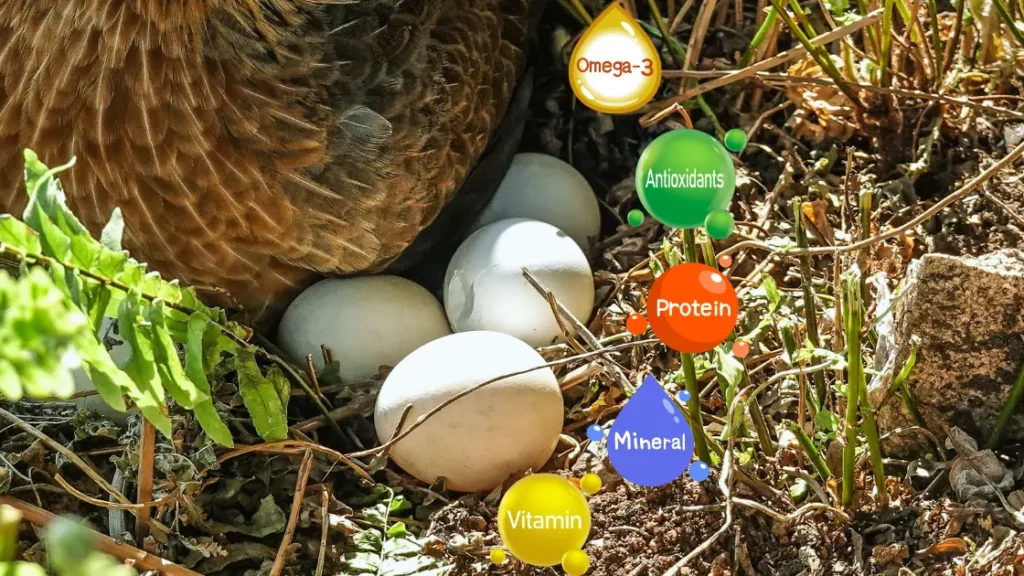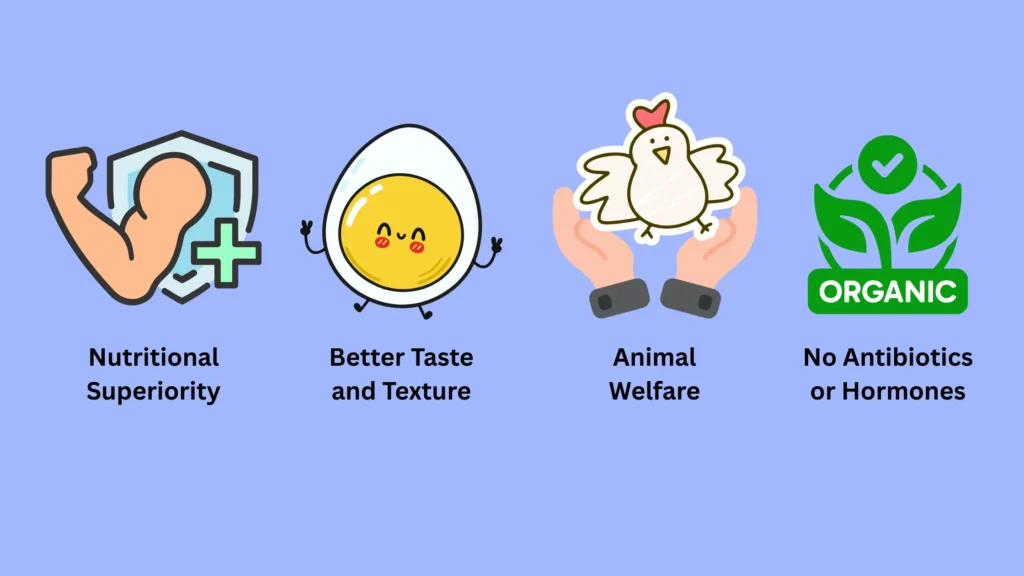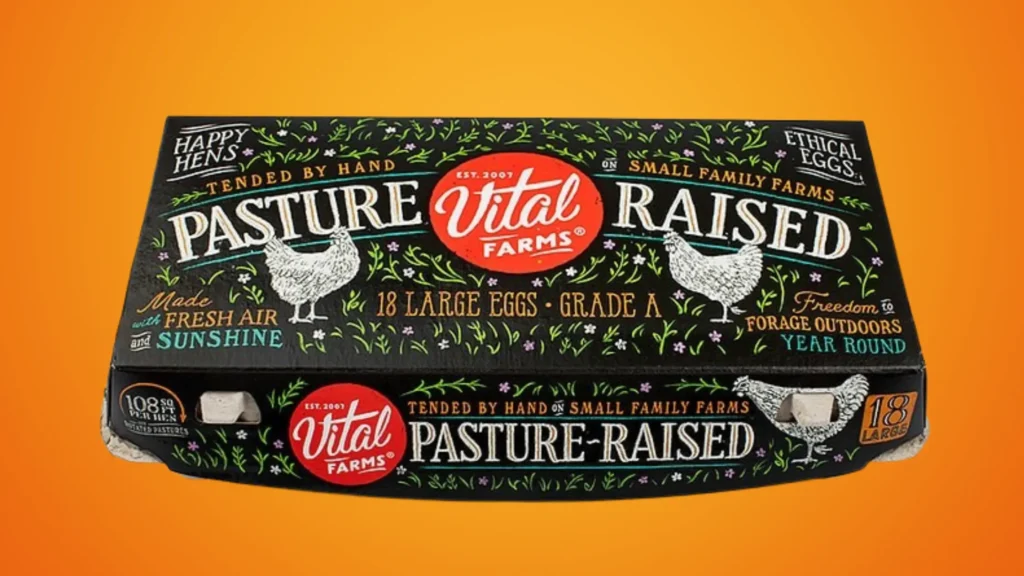Pasture raised eggs have become a staple food for many families trying to improve their nutrition, especially for children and pregnant women. As people’s knowledge of nutrition, ethical farming, and food quality grows, pasture raised eggs are becoming more and more valued for their superior flavor, texture, and nutritional makeup. But why should you choose pasture raised eggs over traditional or even free-range options? In this comprehensive guide, we’ll break down everything you need to know about eggs raised on pasture, from their benefits to where to buy them, and why they are a healthier choice for your family.
What Are Pasture Raised Eggs?

Pasture raised eggs come from hens raised in an environment that allows them to roam freely on pasture. Unlike conventional caged hens, which are confined to small spaces, pasture raised hens have access to large outdoor areas where they can forage for food, such as grass, seeds, insects, and worms. This outdoor access ensures that the hens live a more natural life and that the eggs they produce have a much higher nutritional value.
What Makes Pasture Raised Eggs Special?
The most important distinguishing factor of pasture raised eggs is how the hens are raised. These hens are given plenty of space to roam freely on a pasture that is not overcrowded. On a pasture that is not overcrowded, these hens are allowed plenty of room to roam around. They are free to engage in natural activities, such as foraging, pecking, scratching, and dust bathing. Compared to factory-farmed or cage-free eggs, the eggs produced by this lifestyle are higher in vital nutrients.
Moreover, eggs raised on pasture are often produced with minimal intervention in the hen’s diet and living conditions, ensuring that the eggs remain free from harmful chemicals, hormones, and antibiotics. The hens are fed a natural diet that can include grass, worms, seeds, and even insects, all of which contribute to the superior quality of the eggs.
Are Pasture Raised Eggs Healthier?
Indeed, compared to conventionally raised eggs, pasture raised eggs are much healthier. eggs raised on pasture have a unique nutritional profile in several important ways:

Omega-3 Fatty Acids:
Allowing hens to roam on pasture gives them access to a diet high in omega-3 fatty acids. These fatty acids are necessary for brain development, heart health, and inflammation reduction. Compared to eggs from conventionally raised hens, pasture-raised eggs have a higher omega-3 content, which makes them exceptionally healthy for expectant mothers and their unborn children.
Vitamins and Minerals:
Pasture raised eggs contain higher levels of vitamins such as vitamin D, A, and E. For healthy bones and a strong immune system, vitamin D is essential, especially for expectant mothers and small children. While vitamin E is an antioxidant that aids in the fight against oxidative stress and promotes skin health, vitamin A supports skin health, immune function, and eye health.
Protein Quality:
Eggs are a excellent source of high-quality protein. Pasture raised eggs have a richer protein profile, which is beneficial for developing children and adults alike. Protein is essential for immune system function, hormone production, and tissue growth and repair.
Antioxidants:
The diet of pasture raised hens contributes to higher antioxidant levels in the eggs. Antioxidants like lutein and zeaxanthin, which support eye health and may help reduce the risk of chronic diseases, are present in larger amounts in pasture raised eggs than in conventional eggs.
Benefits of Pasture Raised Eggs

1. Nutritional Superiority
As mentioned, pasture raised eggs are higher in omega-3 fatty acids, vitamins D, E, and A, and antioxidants. This makes them an excellent food choice for pregnant women and children. Omega-3s are particularly important for pregnant moms as they support brain development in the fetus. The extra vitamins and healthy fats support children’s overall growth and immune system development.
2. Better Taste and Texture
Many consumers report that pasture raised eggs have a richer flavor and creamier texture than conventional eggs. This is because the hens are fed a natural and varied diet, which results in eggs with a more complex flavor profile. Whether you are scrambling, frying, or baking with them, eggs raised on pasture are more flavorful than traditional eggs.
3. Animal Welfare
Another major advantage of pasture raised eggs is the ethical treatment of the hens. Hens raised on pastures have access to open fields where they can roam freely, which is far superior to the confinement of battery cages. A happier, healthier hen and, consequently, a higher-quality egg are the results of letting the hens indulge in their natural habits, which include dust bathing, scratching, and pecking.
4. No Antibiotics or Hormones
Unlike many conventionally raised eggs, pasture raised eggs come from hens that are not given antibiotics or hormones. Given that they are more susceptible to the negative effects of chemicals, pregnant women and small children should give careful thought to this. For your family, eggs raised on pasture are a healthier and more natural choice.
Pasture Raised Eggs Vs Free Range Eggs
There is often confusion between pasture raised eggs and free range eggs. Although the hens’ access to the outdoors is implied by both terms, their living arrangements differ noticeably:
- Free Range Eggs: Although hens are allowed to spend time outside, there can be significant variations in the quantity and caliber of their outdoor space. In some cases, the outdoor area may be small and overcrowded, which limits the hens’ ability to forage and roam freely.
- Pasture Raised Eggs: Hens are given access to large, open pastures where they can roam freely and engage in natural behaviors like foraging for insects, seeds, and plants. The pasture is typically well-maintained to ensure that the hens have ample space and access to a varied diet.
Here is a table comparing Pasture Raised Eggs Vs Free Range Eggs:
| Feature | Free Range Eggs | Pasture Raised Eggs |
| Outdoor Access | Hens have outdoor access, but space and quality can vary. | Hens have access to large, open pastures to roam freely. |
| Living Space | Outdoor space may be small and overcrowded. | Ample space for hens to roam and forage naturally. |
| Foraging and Diet | Limited foraging; diet is mostly feed. | Hens forage for insects, plants, and seeds, leading to a varied diet. |
| Welfare and Health | Overcrowding may limit natural behavior and cause stress. | Hens are less stressed and have better welfare with natural behavior. |
| Egg Quality | Higher nutrition than conventional eggs, but less than pasture-raised. | Richer in omega-3s, vitamins, and antioxidants. |
| Living Conditions | Indoor areas can be overcrowded. | Hens live in humane conditions with access to spacious pastures. |
| Price | More affordable than pasture raised eggs. | Typically more expensive due to better living conditions. |
This table clearly shows that while free-range eggs offer some benefits over conventional eggs, pasture raised eggs provide the best conditions for the hens, leading to superior quality eggs that are richer in nutrients. For both nutritional value and animal welfare, eggs raised on pasture are the best option.

Cage Free vs Pasture Raised Eggs
While both cage free and pasture raised eggs indicate that the hens are not confined to cages, there are important differences:
- Cage-Free: Hens are allowed to roam freely indoors but do not have access to outdoor areas. They often live in crowded conditions that limit their ability to roam, scratch, and forage.
- Pasture Raised: Hens are given access to large, open pastures where they can roam freely, forage for insects and plants, and live a more natural life. Pasture raised eggs are considered a superior option due to the more natural and humane conditions under which the hens are raised.
Here’s a table comparing Cage Free vs Pasture Raised Eggs:
| Feature | Cage-Free Eggs | Pasture Raised Eggs |
| Living Conditions | Hens roam freely indoors, but are often confined to small spaces. | Hens have access to large, open pastures, allowing them to roam freely. |
| Outdoor Access | No access to outdoor areas. | Full access to outdoor pastures for foraging and natural behaviors. |
| Space per Hen | Limited space indoors, often overcrowded. | Hens have plenty of space to roam and forage naturally. |
| Diet | Diet is typically made up of grain-based feed. | Diet includes grass, seeds, insects, and plants, contributing to richer nutrition. |
| Natural Behaviors | Limited opportunity for hens to engage in natural behaviors like scratching and dust bathing. | Hens can engage in natural behaviors like scratching, dust bathing, and foraging. |
| Egg Quality | Eggs may be nutritious but often have lower omega-3s and vitamins. | Eggs are richer in omega-3 fatty acids, vitamins D, A, and E. |
| Humane Conditions | While not confined to cages, conditions are often still restrictive. | Hens are raised in a more humane and natural environment. |
| Price | Typically less expensive than eggs raised on pasture. | Generally more expensive due to ethical farming practices. |
Where to Buy Best Pasture Raised Eggs
Due to the growing demand for wholesome and ethical foods, finding high-quality pasture raised eggs is now simpler than ever. You can locate them in the following locations:
1. Vital Farms
The high-quality pasture raised eggs from Vital Farms are well-known. Raising their hens in open fields also allows their hens to roam freely, pecking grass and foraging natural food. Their free-range lifestyle ensures that the eggs are rich in omega-3s and vitamin D among other essential nutrients. Vital Farms is a common choice among families who prefer healthy and ethically sourced eggs due to its focus on free and humane farming practices. Their taste and quality are well known and they are available in most grocery stores around the country.

2. Pete and Gerry’s
Pete and Gerry’s offers premium pasture raised eggs from small family farms. They ensure their hens are raised on open pastures, with access to fresh air, sunlight, and a natural diet. This approach results in eggs that are high in nutritional value, including omega-3 fatty acids and vitamins. Known for their commitment to sustainability and animal welfare, Pete and Gerry’s eggs are organic-certified and free from antibiotics and hormones, making them a reliable choice for health-conscious consumers across the U.S.
3. Happy Egg Co.
Happy Egg Co. is committed to offering pasture raised eggs from hens that have lots of space to roam around in. Because their hens are permitted to forage on natural pastures, the eggs they produce are higher in nutrients like vitamin D and omega-3 fatty acids. The business is dedicated to the well-being of its hens, making sure they are not confined and have a stress-free environment. Happy Egg Co. has become a well-liked and moral option for families looking for high-quality eggs.

4. Aldi
Aldi provides eggs raised on pasture under their Goldhen brand, offering a cost-effective option for those seeking high-quality, ethically raised eggs. The hens are given access to pastures where they can forage, leading to eggs that are richer in essential nutrients like omega-3 fatty acids. Aldi’s focus on affordable prices makes these eggs a popular choice for budget-conscious families who want to support humane farming practices. Available in many stores, Aldi’s pasture raised eggs are known for both quality and value.
5. Costco
Costco offers a variety of pasture raised eggs, including its own brand, Kirkland Signature. These eggs are produced by hens that are raised in open, spacious environments and have access to fresh pastures. Costco makes buying high-quality eggs raised on pasture affordable by offering them in bulk, making them a great option for large families or frequent egg consumers. Customers can purchase healthy, ethical eggs at a fair price without compromising quality thanks to Costco, which is well-known for its low prices.
6. Whole Foods
The famous brands Vital Farms and Pete and Gerrys guarantee that the eggs they sell are those that were produced by hens that were kept in large outdoor spaces. Whole Foods is known for providing a wide range of organic and ethically sourced products, including pasture raised eggs. Whole Foods promotes sustainable farming and animal welfare, which is why it is a perfect place to find health-conscious consumers. Families can make well-informed decisions about eggs raised on pasture thanks to their commitment to quality and transparency, which guarantees both flavor and nutrition.

7. Local Farmers’ Markets
Local farmers’ markets are one of the best places to find fresh pasture raised eggs. These markets often feature small-scale, local farmers who raise hens in humane conditions, allowing them access to pastures where they can forage. Purchasing eggs directly from farmers ensures the highest quality and freshness, and supports local agriculture. The availability of pasture raised eggs can vary by location, but visiting these markets offers a direct connection to ethical farming practices and ensures you are getting eggs that are free from harmful chemicals.
FAQ: Pasture Raised Eggs
Q1: Are pasture raised eggs healthier than conventional eggs?
Because they contain more omega-3 fatty acids, vitamins, and antioxidants than conventional eggs, pasture raised eggs are generally healthier.
Q2: Where can I buy pasture raised eggs?
You can buy pasture raised eggs at major retailers like Whole Foods, Costco, Aldi, and local farmers’ markets.
Q3: What is the difference between cage free and pasture raised eggs?
Cage free eggs come from hens that live indoors without cages, while eggs raised on pasture come from hens that have access to large, open pastures where they can roam freely.
Q4: Are organic pasture raised eggs available?
Yes, many brands offer organic pasture raised eggs, which are produced from hens fed organic feed and raised in humane conditions.
Q5: Why should pregnant women eat pasture raised eggs?
Pasture raised eggs provide essential nutrients such as omega-3s, vitamin D, and choline, which support brain development and overall health during pregnancy.
You should have a thorough understanding of the advantages, nutritional profile, and available sources of eggs raised on pasture after reading this guide. Pasture raised eggs are a healthier and more moral option for you and your family, whether you’re a pregnant woman, a parent, or just trying to eat better.
Explore more on Pregnancy Must –









